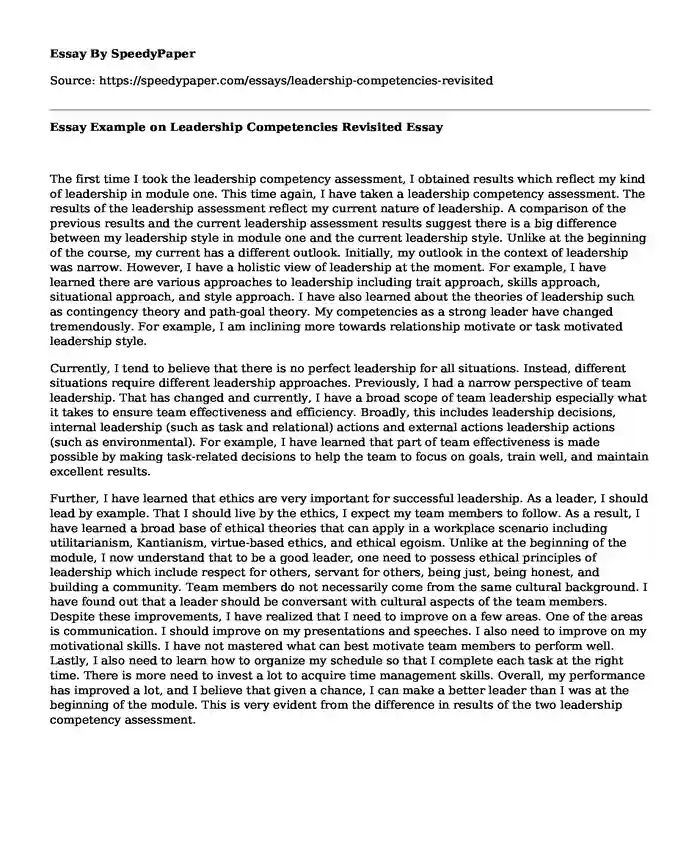
| Type of paper: | Essay |
| Categories: | Leadership analysis Management Personality |
| Pages: | 2 |
| Wordcount: | 532 words |
The first time I took the leadership competency assessment, I obtained results which reflect my kind of leadership in module one. This time again, I have taken a leadership competency assessment. The results of the leadership assessment reflect my current nature of leadership. A comparison of the previous results and the current leadership assessment results suggest there is a big difference between my leadership style in module one and the current leadership style. Unlike at the beginning of the course, my current has a different outlook. Initially, my outlook in the context of leadership was narrow. However, I have a holistic view of leadership at the moment. For example, I have learned there are various approaches to leadership including trait approach, skills approach, situational approach, and style approach. I have also learned about the theories of leadership such as contingency theory and path-goal theory. My competencies as a strong leader have changed tremendously. For example, I am inclining more towards relationship motivate or task motivated leadership style.
Currently, I tend to believe that there is no perfect leadership for all situations. Instead, different situations require different leadership approaches. Previously, I had a narrow perspective of team leadership. That has changed and currently, I have a broad scope of team leadership especially what it takes to ensure team effectiveness and efficiency. Broadly, this includes leadership decisions, internal leadership (such as task and relational) actions and external actions leadership actions (such as environmental). For example, I have learned that part of team effectiveness is made possible by making task-related decisions to help the team to focus on goals, train well, and maintain excellent results.
Further, I have learned that ethics are very important for successful leadership. As a leader, I should lead by example. That I should live by the ethics, I expect my team members to follow. As a result, I have learned a broad base of ethical theories that can apply in a workplace scenario including utilitarianism, Kantianism, virtue-based ethics, and ethical egoism. Unlike at the beginning of the module, I now understand that to be a good leader, one need to possess ethical principles of leadership which include respect for others, servant for others, being just, being honest, and building a community. Team members do not necessarily come from the same cultural background. I have found out that a leader should be conversant with cultural aspects of the team members. Despite these improvements, I have realized that I need to improve on a few areas. One of the areas is communication. I should improve on my presentations and speeches. I also need to improve on my motivational skills. I have not mastered what can best motivate team members to perform well. Lastly, I also need to learn how to organize my schedule so that I complete each task at the right time. There is more need to invest a lot to acquire time management skills. Overall, my performance has improved a lot, and I believe that given a chance, I can make a better leader than I was at the beginning of the module. This is very evident from the difference in results of the two leadership competency assessment.
Cite this page
Essay Example on Leadership Competencies Revisited. (2019, Sep 12). Retrieved from https://speedypaper.net/essays/leadership-competencies-revisited
Request Removal
If you are the original author of this essay and no longer wish to have it published on the SpeedyPaper website, please click below to request its removal:
- Finance Essay Sample: A Concern for Foreign Direct Investment by Canadian Firm
- Free Paper about Sudden Cardiac Death in Young Competitive Athletes
- Free Essay. Forms of Precolonial or Pre-Capitalist States in South East Asia
- Free Essay. Importance of Integrated Marketing Communication
- Essay Example: Explanation of the Social Problem
- Paper Example. Training and Development in Walmart Organization
- From Conformity to Liberation: The Evolution of American Women's Rights in the 1950s-70s - Essay Example
Popular categories




